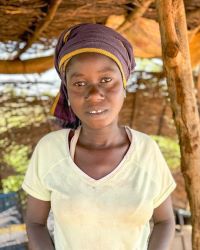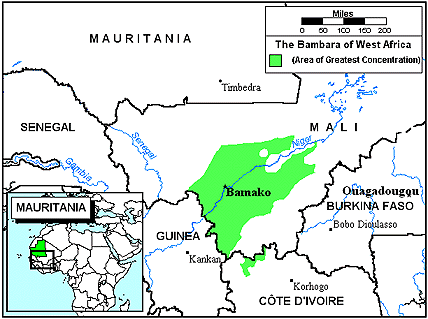The Bambara have long influenced the areas in which they live. During the eighteenth century there were two Bambara kingdoms in West Africa: the kingdom of Segu and the kingdom of Kaarta. However, in the mid-1800s, Muslim rivals overthrew their rule. For many years, the warlords resisted Muslim occupation. Then, early in the twentieth century, the French gained control, bringing an increase in trade. Many Bambara converted to Islam as they were exposed to Muslim trading groups. Because Fulani, Soninke, and Malinke cities and lands were absorbed into the Bambara kingdoms, their cultural influences remained part of the Bambara lifestyle. They speak Bamana. The Bambara are located mostly in Mali, though they live in other countries including Mauritania where they live near the town of Timbedra. As a large people group, they are represented in many West African countries.
The Bambara are mostly farmers with a unique cooperative system of agriculture. As a single unit, an entire community plows, plants, weeds, and harvests. Together they cultivate their principal crops of millet, rice and sorghum. In addition to these, they also grow casava, tobacco and various vegetables. Many Bambara also keep animals such as goats, chickens and cattle. They sometimes hire neighboring Fulani herders to tend to the latter. Within the community, men are responsible for hunting, fishing, tending to the animals, conducting foreign trade, clearing land, and doing most of the farm work. Women's duties include gathering forest products, caring for the chickens, cultivating garden plots, and trading in local markets. Their diet consists mainly of meat, rice, groundnuts, mangoes, and yams. From the forests and bush, they gather wild seeds, fruits, kola nuts, shea nuts, and palm oil. Crafts, such as dyeing, woodworking and leather-working remain a part of Bambara life. The Bambara live in compact, permanent villages or towns. Their houses are rectangular with flat terraced roofs made of beaten earth. Each has an interior courtyard and an external wall of sun-dried brick. A number of these homes compose a village or town, which is normally divided into wards or quarters. In the center of almost every village is a baobab tree where the elders sit to judge disputes and make decisions. The chief of each village is called "Master of the Land." He plays a "supernatural role" as communicator between the land and the spirits of the ancestors who first settled it. The Bambara often practice polygyny, a man having more than one wife. The first wife enjoys a superior status and dominates the other wives. Each wife has her own house where she raises her children. They value education, and children are encouraged to attend school so that they might receive a "Western" education. Although most Bambara live in rural areas, some have flourished under the modernization brought by the French. These Bambara have moved into the major cities where they have become influential in commercial and transport industries.
Many aspects of traditional Bambara religion coexist with Islam. They believe in a supreme creator god as well as in gods of the air and water. Ancestor worship is central to their ethnic religion. They believe their ancestors take the form of animals or even vegetables. They perform special rites to worship them. The eldest male of a lineage serves as mediator between the living and the dead. Because of his age, he is considered nearest to the world of the departed. They believe the dead should be appeased with offerings of millet flour and water.
The ongoing drought is causing many problems for the Bambara, resulting in a shortage of food and great loss of livestock. Also, the literacy rate is low. Christian educators may be one way to minister to them. The spiritual needs of the Bambara are even greater than their physical needs. Various resources are available, but the number of believers is small. Urgent prayer is needed to reach the Bambara with the Gospel of Christ.
Pray for the Lord to provide an abundant harvest for the Bambara as a demonstration of his goodness and power. Pray for a spiritual hunger that will drive the Bambara people into the loving arms of Jesus Christ. Pray for the Lord to thrust out loving ambassadors to the Bambara people in Mauritania. Pray for an unstoppable movement to Christ among the Bambara people.
Scripture Prayers for the Bambara in Mauritania.
| Profile Source: Joshua Project |












